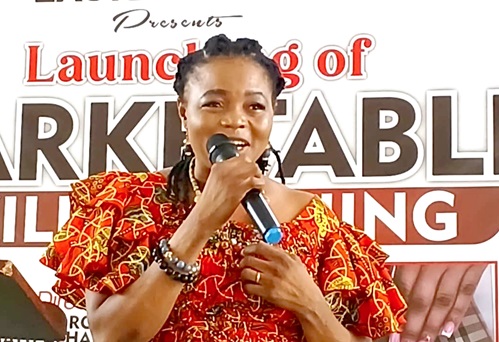The Eastern Region Office of the Centre for National Culture (CNC) has launched a training programme to equip the youth with the necessary employable skills to make them competitive in the job market.
The one-month training programme dubbed "Marketable Skills Training" involves bead-making, batik tie dying, drumming and dancing, manicure and pedicure, interior and exterior decoration, weaving, sewing, hairdressing and fun creation at ceremonies.
The programme, which is intended to be an annual event, is aimed at equipping the beneficiaries with practical skills to promote self-reliance and economic growth.
Self-reliant
The beneficiaries, after acquiring the necessary skills, will be self-reliant and also employ others.
![]()
Some of the participants in the Koforidua training
At the event which was organised by the CNC at its auditorium in Koforidua last Tuesday, the acting Regional Director of the CNC, Dorcas Salamatu Alhassan, said the training was the first of its kind to be organised by her outfit and she took the inspiration from a similar training held at the Central Region Office of the CNC where she was, which had been of tremendous benefit to the beneficiaries.
"I took the inspiration from the Central Regional office headed by Carl Oparebea, who initiated such a training programme which proved successful and beneficial for the youth and I hope it will also be of benefit for the youth here," she stated.
Mrs Alhassan explained that with the training, the beneficiaries would be able to get more money or income for themselves to cater for their dependents.
The beneficiaries, she further stressed, would be able to train and employ others and that would create more jobs for the unemployed youth.
Training materials
Mrs Alhassan stated that the main challenge was the acquisition of training materials and appealed for support in that regard to be able to train more than the 50 or more currently on board and extend the number to 100 or more.
Some of the materials for the training, she said, were dryers, facial make-up kits, raw materials and textile materials, which were very expensive.
The Eastern Regional Minister, Rita Akosua Adjei Awatey, whose speech was read by an Assistant Director of the Regional Coordinating Council, Alexander Gasu, said she was happy that the training programme would not only create jobs but would also promote and preserve Ghana's cultural heritage.
She said that as managers of culture, it was the CNC’s duty to find innovative ways and pragmatic measures to preserve cultural values to sustain good practices for generations in this ever-evolving technological era.
Mrs Awatey stated that making such skills in the cultural arena economically viable had shown the preparedness of the CNC in harnessing Ghana's cultural heritage as a resource for economic growth.
The regional minister emphasised that blending traditional crafts and artistic expression with practical skills could generate income and improve livelihoods.
Mrs Awatey said the government’s broad objectives of empowering the citizens and creating jobs aligned perfectly with the programme, adding that by fostering local talents and offering training in valuable skills, they would be creating a more prosperous and self-sufficient community.
Writer's email: haruna.wunpini@graphic.com.gh

